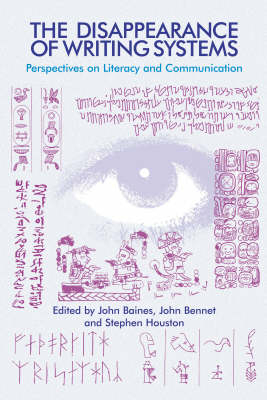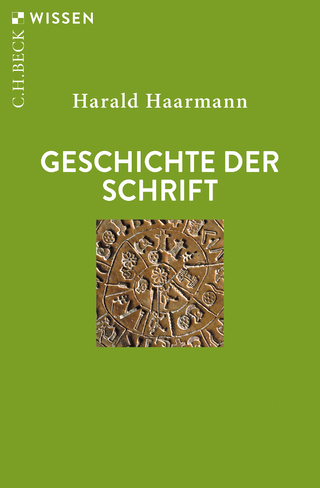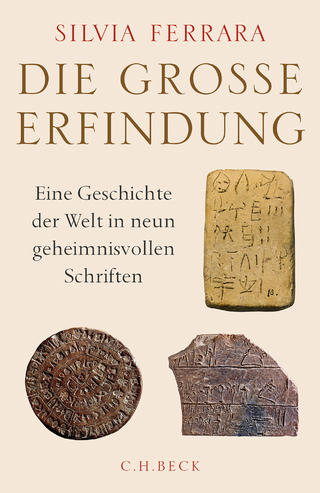
The Disappearance of Writing Systems
Equinox Publishing Ltd (Verlag)
978-1-84553-013-6 (ISBN)
This volume gathers papers from the first conference ever to be held on the disappearance of writing systems, in Oxford in March 2004. While the invention and decipherment of writing systems have long been focuses of research, their eclipse or replacement have been little studied. Because writing is so important in many cultures and civilizations, its disappearance - followed by a period without it or by replacement by a different writing system - is of almost equal significance to invention as a mark of radical change. Probably more writing systems have disappeared than survived in the last five thousand years. Case studies from the Old and New Worlds are presented, ranging over periods from the first millennium BC to the present. In order to address many types of transmission, the broadest possible definition of 'writing' is used, notably including Mexican pictography and the Andean khipu system.One chapter discusses the larger proportion of known human societies which have not possessed complex material codes like writing, offering an alternative perspective on the long-term transmission of socially salient subjects.
A concluding essay draws out common themes and offers an initial synthesis of results. This volume offers a new perspective on approaches to writing that will be significant for the understanding of writing systems and their social functions, literacy, memory, and high-cultural communication systems in general.
John Baines is Professor of Egyptology at the University of Oxford. His principal publications are on Egyptian art, literature, and religion. He has also focused on the role of writing in Egyptian society and on high-cultural legitimations and concerns of elites. His publications include Visual and Written Culture in Ancient Egypt (2007) and High Culture and Experience in Ancient Egypt (in preparation for Equinox). John Bennet is Professor of Aegean Archaeology at the University of Sheffield, UK, and has received his doctorate from Cambridge University. He has held positions at the University of Wisconsin-Madison and Oxford University, where he was Sinclair and Rachel Hood lecturer in Aegean Prehistory. His research interests include the archaeology of complex societies, writing and administrative systems (especially Linear B), and diachronic landscape archaeology.Stephen Houston, a specialist in Maya civilization, is Professor of Anthropology and Professor of Archaeology at Brown University. Houston has authored some 200 articles, book chapters, and reviews. The founding co-editor of Ancient Mesoamerica, he is also co-editor of a dozen technical monographs on archaeological work in Guatemala, and author or editor of twelve books, the most recent of which is The Memory of Bones: Body, Being, and Experience among the Classic Maya (with David Stuart and Karl Taube, 2006). His current research focuses on urbanism in Mesoamerica, the history of colour in the New World, Maya architecture, and the origins, development, and extinction of writing.
1. John Bennet, Now You See It; Now You Don't! The Disappearance of the Linear A Script on Crete2. J. David Hawkins, The Disappearance of Writing Systems: Hieroglyphic Luwian3. Jeremy Black , The Obsolescence and Demise of Cuneiform Writing in Elam 4. David Brown, Increasingly Redundant: The Growing Obsolescence of the Cuneiform Script in Babylonia from 539 BCPostscript: Jerrold Cooper, Redundancy Reconsidered: Reflections on David Brown's Thesis5. Kathryn Lomas, Script Obsolescence in Ancient Italy: From Pre-Roman to Roman Writing6. Richard Salomon, Whatever Happened to Kharoṣṭhi? The Fate of a Forgotten Indic Script7. Martin Andreas Stadler, On the Demise of Egyptian Writing: Working with a Problematic Source Basis8. Claude Rilly, The Last Traces of Meroitic? A Tentative Scenario for the Disappearance of the Meroitic Script9. M. C. A. Macdonald, The Phoenix of Phoinikcia: Alphabetic Reincarnation in Arabia10. Stephen D. Houston, The Small Deaths of Maya Writing11. Elizabeth Hill Boone, The Death of Mexican Pictography12. Frank Salomon, Late Khipu Use13. Giovanni Stary, Disappearance of Writing Systems: The Manchu Case14. John Monaghan, Revelatory Scripts, 'the Unlettered Genius', and the Appearance and Disappearance of Writing 15. Chris Gosden, History without Text16. John Baines, Writing and its Multiple Disappearances
| Erscheint lt. Verlag | 15.12.2008 |
|---|---|
| Zusatzinfo | 63 b&w figures |
| Verlagsort | London |
| Sprache | englisch |
| Maße | 156 x 234 mm |
| Themenwelt | Geschichte ► Hilfswissenschaften ► Paläografie |
| Geschichte ► Teilgebiete der Geschichte ► Kulturgeschichte | |
| Geisteswissenschaften ► Sprach- / Literaturwissenschaft ► Sprachwissenschaft | |
| ISBN-10 | 1-84553-013-6 / 1845530136 |
| ISBN-13 | 978-1-84553-013-6 / 9781845530136 |
| Zustand | Neuware |
| Haben Sie eine Frage zum Produkt? |
aus dem Bereich


